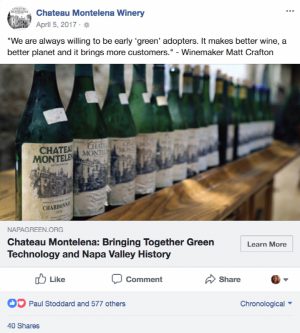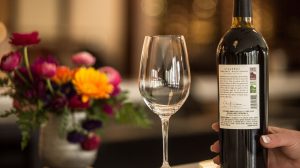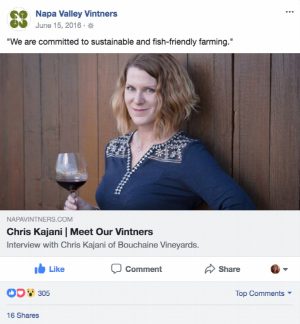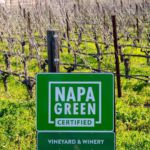
Napa Green participants have a sustainability story to share with consumers, trade and the media.

Napa Green logos are helping wineries start conversations with consumers about their committment to sustainability.

Vintners can leverage their participation across all communication channels, including their membership with the Napa Valley Vintners.
Are You Leveraging Your Sustainability Certification?
Today, we find the end consumer has a greater degree of interest in knowing that the wine they buy is both grown and produced in a sustainable manner. For our 2016 vintage, we have added the Napa Green logo to our back label to help convey that message.
- Bruce Cakebread, President and CEO of Cakebread Cellars
When a company supports a social or environmental issue, 92 percent of consumers say they have a more positive image of the company; 87 percent are more likely to trust the company; and 88 percent say they would be more loyal to the company.
- 2017 Cone Communications CSR Study
One of the main benefits of Napa Green certification is the opportunity to have a new conversation with consumers. Many wineries have similar stories about unique soils, vineyard microclimates, terroir. Napa Green certification provides new positioning, new engagement, new stories for visitors that can help a winery standout and serve as an added incentive to join the wine club.
- John Garn, Sustainability Consultant, ViewCraft
There is also growing evidence that wine consumers are willing to pay a premium for sustainable products. A 2015 Nielsen Global CSR study found that more than 70 percent of millennials and 50 percent of baby boomers were willing to pay more for a socially or environmentally responsible product. In 2017, Sonoma State University surveyed 300 wine consumers and the majority indicated they would pay $1-3 more for a bottle of certified sustainable, organic or Biodynamic wine. Notably, economists at Washington State University recently analyzed 45,000 red wine ratings by Wine Spectator from 1989 to 2014 and found that Napa Green certified wines demanded a price premium of $4.40 a bottle.
Underselling Sustainability
St. Supéry is very proud to be both Napa Green Certified Land and Winery. It’s definitely a marketing point. We display the logos on the back of all our bottles and talk about the certification in every presentation. At every tasting, people notice the logos and ask, ‘What does Napa Green mean?’ They want to know about the third-party certification. It is important to the consumer.
- Brooke Shenk, Winemaker, St. Supéry Estate Vineyards & Winery
I've been at this for 30 years and this is the best, most well-thought-out program I've ever seen.
- Yvon Chouinard, Environmentalist and Founder of Patagonia


